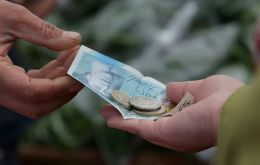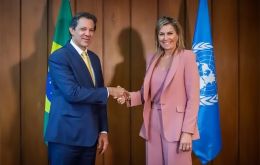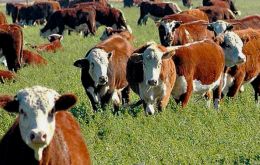MercoPress. South Atlantic News Agency
Economy
-
Thursday, June 8th 2023 - 16:07 UTC
Germany recruiting skilled labor, particularly nurses in Brazil

German Labour Minister Hubertus Heil and Brazilian Labour Minister Luiz Marinho signed a declaration of intent for “fair immigration” to promote the exchange of skilled workers.
-
Thursday, June 8th 2023 - 16:05 UTC
IMF suggests immigration could help UK with inflation and labor shortage

Immigration that fills gaps in the domestic jobs market can help push down UK inflation, the deputy head of the International Monetary Fund has said. However British prime minister Rishi Sunak has insisted rates of legal immigration are “too high”
-
Thursday, June 8th 2023 - 16:03 UTC
OECD: UK inflation highest this year; BoE rate could peak 5,25%

OECD, the Organization for Economic Cooperation and Development anticipated the UK will experience the highest level of inflation among all advanced economies this year. UK is set to report a headline inflation of 6.9% this year, above the OECD average of 6.6% for 2023.
-
Thursday, June 8th 2023 - 15:14 UTC
Falklands budget, “it won't be easy for the private sector”

The latest announcements on the Falkland Islands budget have not gone without comments from the Falklands Chamber of Commerce and its current president Mike Summers, according to an interview on the local television channel.
-
Thursday, June 8th 2023 - 10:55 UTC
Fitch upgrades Uruguay's rating

Thanks to Uruguay's ”solid fiscal performance that allowed it to absorb the shock of the Covid-19 pandemic, added to the track record of compliance with the fiscal framework, which has improved its credibility, increased resilience to economic shocks and reduced the risk of a potential increase in the stock of public debt.
-
Thursday, June 8th 2023 - 08:59 UTC
UK's CBI survives, but many questions remain and members holding out

The powerful lobby Confederation of British Industry, CBI has won a key confidence vote over its future after members overwhelmingly backed the lobby group following a series of scandals.
-
Wednesday, June 7th 2023 - 10:12 UTC
World Bank releases contrasting projections for Brazil and Argentina

The World Bank foresees a 1.2% growth this year for the Brazilian economy and a 2% contraction for that of Argentina, it was reported Tuesday.
-
Wednesday, June 7th 2023 - 10:07 UTC
Plan to fight indebtedness launched in Brazil

The Desenrola plan, a scheme devised by the Government of President Luiz Inácio Lula da Silva to help people pay their debts, will be accompanied by a financial education program, said Finance Minister Fernando Haddad Tuesday upon elaborating alongside Queen Maxima of The Netherlands on the project launched the day before, Agencia Brasil reported.
-
Wednesday, June 7th 2023 - 10:07 UTC
Banco Itaú working its way out of Argentina

Banco Itaú is planning to close its operations in Argentina and is already in negotiations with Banco Macro S.A. for a buy-over, it was reported in Buenos Aires Tuesday.
-
Wednesday, June 7th 2023 - 10:00 UTC
Uruguay meat exports five months year-on-year down 25%

Uruguay’s revenue from meat exports dropped 25% year-on-year, some US$ 350 million less, according to data released this week by the National Meat Institute (INAC). In the first five months of 2023, US$ 1.055 billion worth of bovine meat was exported, clearly below the US$ 1.408 billion obtained in the same period of 2022.
